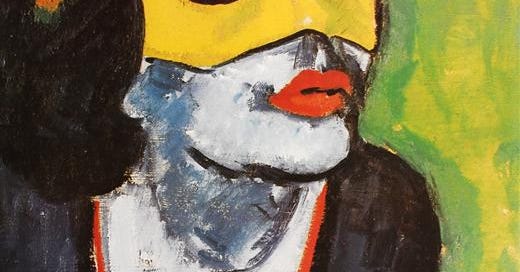I've been reading Anne Carson's translation of the Oresteia, which captures that pathological strain of rejection that so many young women live out in some form or another:
At one point, the implacable Elektra says:
I need one food:
I must not violate Elektra.
In response to a chorus that cajoles her to wear her suffering more lightly, Elektra protests: "I ask this one thing: let me go mad in my own way."
But, of course, it's a rare young woman who goes mad in her own way.
Even and especially our most intimate self-understandings aren't really ours. Even our desperate escape routes are predetermined, mapped out. Even in rejection, we act out in sensible, legible ways. Cultural recruitment, medical shaping, and the unconscious search for a symptom presentation that will be taken seriously all play a role in the way distress manifests.
Again—and again—and again—throughout the dark history of medicine—medical providers and young female patients alike converge on diagnoses and ‘treatments’ that pathologize and discipline the female body.
In both anorexia and gender dysphoria, the patient dissociates mind and body, then submits the body ruthlessly to the mind’s will. Forget Merleau-Ponty’s body-subjects. Forget Beauvoir’s “first radiation of subjectivity.” For anorexics and gender-dysphorics, the mind rules over the body like a brutal despot, beating the body—whittled by starvation or surgery, sacked and pillaged—into submission.
Medical providers tend to frame anorexia as the pathological pursuit of an (objectified) female form. I tend to see it as the opposite: a pathological rejection of objectification and sexual development. The fear isn’t becoming fat so much as becoming flesh. The anorexic persecutes the body that betrays ‘the self’ by its very existence: by its femaleness, by its soft curves and dark secrets, by blood, by the reproductive potential written into female flesh and by the things society writes on that flesh. Anorexics aspire to be pure spirit, pure intellect. They need only one food: not to violate the ‘self’ by becoming flesh.
Transition, too, scapegoats the body for its failure to faithfully represent ‘the self.’ Gender-dysphoric people talk about feeling like a ‘brain in a jar’ or a gender identity stuck in a ‘meat vehicle’ or ‘flesh suit.’ Major surgeries are spoken about with cool disregard, as though they were minor home-remodeling projects.
Take the concept of passing, a concept fundamentally opposed to the experience of becoming or being. Passing is all about how something looks from the outside, not how something feels from the inside. On the altar of passing, clinicians and patients sacrifice health and function. If transition is about becoming your true self, why is there so little focus on being and so much focus on appearing, seeming, passing, and pretending? Why edit the past, rather than own it? Why cut out organs and discipline natural gestures? No, something else is going on here: the pathological exercise of control over a body alienated from the self.
Of course, the problem of embodiment isn’t an exclusively female one. Human beings have always struggled with the gap between our limitless imaginations and our mortal bodies that ail and age and die. But for women, the body has been particularly problematic. Throughout history, women have been defined by our bodies. We’ve been cast as flesh in opposition to men’s spirit and intellect, at the expense of our own spirit and intellect. Today—ironically—you can see this clearly in the ways that ‘inclusive’ language dismembers women into body parts and functions and services—language that can only increase the alienation and dissociation many girls and young women already feel. Meanwhile, male bodies stay linguistically intact.
When we make ‘woman’ into a gender identity and scramble for neologisms to cover the uses to which female bodies are put, something gets lost. We end up with no language at all for the experience of female embodiment. We create vast, devouring silences. Then we tell girls there’s nothing there: over here, we have identity, and way over there, there’s the body, chopped to bits—cervix, uterus, top, bottom—better not spoken of. When it comes to what it’s like to live inside your body, to be your body: breathing, growing, changing? Forget it. Who needs language for that?
Then we wonder why girls starve, cut, and inject testosterone.















It seems like females have to "pick our poison" when it comes to our relationship with our bodies. We're told from so early on that our bodies simultaneously define us AND are unworthy of respect. What are we to do? Observing the impact of trans ideology reminds me we are not free from the misogyny that divorces us from our bodies and each other. And I truly don't understand how anyone can view it as separate from the misogyny women have been experiencing for centuries.
"If transition is about becoming your true self, why is there so little focus on being and so much focus on appearing, seeming, passing, and pretending?"
Transitioners so often appeal to the inherent virtue of authenticity as justification for blatant inauthenticity. Lea Thomas is a poster child for that bad faith claim. But where exactly does that "true self" reside? Is it in the heart? The kidneys? The spleen? Or, as Descartes supposed, in the pineal gland? How big is it? How much does it weigh?
The entire enterprise of trying to find one's "true self" is as flawed as searching for the end of the rainbow. Self, whether true, false, or simply confused, is a product of an embodied brain in an intricate and lifelong dance with its environment. Anything else is just superstition. Sadly, we live in societies that have, virtually universally, elevated such superstitions to the highest possible seats of power and influence. The greatest tragedy of transgenderism is its service as a trojan horse. It has become the vehicle for subverting science, by injecting this superstition of the true self into its "heart": the reasoned debate whereby true claims are winnowed from false.